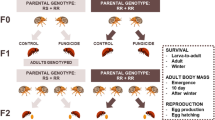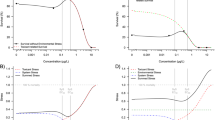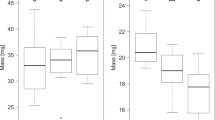Abstract
THE mode of action of insecticides is still very obscure, and it often happens that their relative toxicity is largely dependent on the method of testing employed. Consequently it is difficult to compare the results of one worker with those of another.
This is a preview of subscription content, access via your institution
Access options
Subscribe to this journal
Receive 51 print issues and online access
$199.00 per year
only $3.90 per issue
Buy this article
- Purchase on Springer Link
- Instant access to full article PDF
Prices may be subject to local taxes which are calculated during checkout
Similar content being viewed by others
References
Parkin, E. A., NATURE, 149, 720 (1942).
Busvine, J. R., Ann. Appl. Biol., 25, 605 (1938).
Le Pelley, R. H., and Sullivan, W. N., J. Econ. Ent., 29, 791 (1936).
Darley, M. M., J. Econ. Ent., 29, 111 (1931).
Ginsberg, J. M., and Schmitt, J. B., J. Econ. Ent., 25, 918 (1932).
Robinson, G. G. (unpublished).
Author information
Authors and Affiliations
Rights and permissions
About this article
Cite this article
BUSVINE, J. Relative Toxicity of Insecticides. Nature 150, 208–209 (1942). https://doi.org/10.1038/150208b0
Issue Date:
DOI: https://doi.org/10.1038/150208b0
This article is cited by
-
Woodlice exposed to pollutant gases
Bulletin of Environmental Contamination and Toxicology (1983)
-
THE SEARCH FOR NEW INSECTICIDES
Nature (1943)
Comments
By submitting a comment you agree to abide by our Terms and Community Guidelines. If you find something abusive or that does not comply with our terms or guidelines please flag it as inappropriate.



